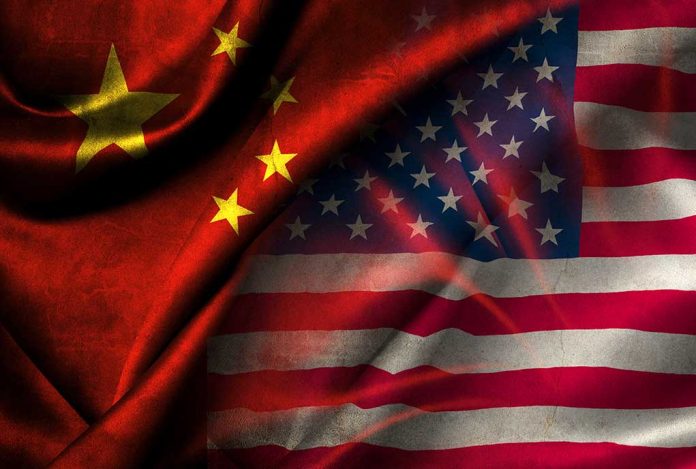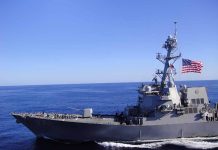
China has escalated tensions with the United States by imposing sanctions on nine American defense firms in response to military equipment sales to Taiwan.
At a Glance
- China sanctioned nine US defense firms over military sales to Taiwan.
- Sanctioned companies will have assets in China frozen and transactions prohibited.
- China views US arms sales to Taiwan as a violation of its sovereignty.
- The US remains Taiwan’s most important partner and arms supplier.
- Taiwan faces increased military pressure from China’s People’s Liberation Army.
China Takes Action Against US Defense Firms
The Chinese foreign ministry announced sanctions against nine US defense firms in retaliation for military equipment sales to Taiwan. This move marks a significant escalation in the ongoing dispute between China and the United States over Taiwan’s status. The sanctioned companies, including Sierra Nevada Corporation, will have their assets in China frozen and transactions with China-based entities prohibited.
🚨China sanctions US defense firms over arms sales to Taiwan. Beijing pressures Washington to ‘stop conniving and supporting Taiwan independence’. This move escalates tensions between the two nations, impacting global security and trade. #China #US #Taiwan #GlobalSecurity #Trad… pic.twitter.com/ZbLdCvF197
— TOP X News (@TOPXNews) September 18, 2024
China’s actions come as a direct response to what it perceives as a violation of its sovereignty and security interests. The Chinese government has long maintained that Taiwan is an integral part of its territory and views any foreign military assistance to the island as a threat to its national security.
This isn’t the first time China has imposed sanctions on US-based defense firms. Following Taiwan’s presidential inauguration, China’s Ministry of Commerce announced sanctions against Boeing as well as two other companies. Before that, the country sanctioned General Atomics and General Dynamics.
US-Taiwan Relations and China’s Stance
The United States switched diplomatic recognition from Taipei to Beijing in 1979 but has remained Taiwan’s most important partner and arms supplier. This relationship has been a constant source of tension between the US and China, with Beijing repeatedly demanding an end to US military cooperation with Taiwan.
“Weapons sales by the United States to China’s Taiwan region have seriously violated the one-China principle,… seriously infringed upon China’s sovereignty and security interests, (and) damaged China-US relations,” foreign ministry spokesman Lin Jian stated.
China’s position on Taiwan has been unwavering, with officials referring to it as “the first red line that cannot be crossed in China-US relations.” The Chinese government has consistently called for the US to halt what it terms “military collusion” with Taiwan.
Impact on US Defense Companies and Future Relations
The sanctions imposed by China thus far target not only defense firms but also extend to senior executives of companies like Northrop Grumman Corporation and General Dynamics. While the full impact of these sanctions remains unclear, they are often seen as largely symbolic gestures. However, they do signal China’s growing assertiveness in responding to what it perceives as challenges to its territorial claims.
Taiwan, meanwhile, is not solely relying on US support. The island is reviving its domestic arms industry, including building a fleet of submarines and extending mandatory military service for men to one year. These efforts are part of Taiwan’s strategy to enhance its defense capabilities in the face of increasing pressure from mainland China.
Broader Implications for US-China Relations
The sanctions are part of a larger pattern of disputes between China and the United States, encompassing issues such as trade, technology access, and actions in the South China Sea. Recent high-level meetings, including one between Jake Sullivan, a top White House aide, and Chinese military official Zhang Youxia, have attempted to address these tensions, but significant disagreements persist.
As the situation continues to evolve, the international community watches closely. The US-Taiwan-China relationship remains a complex and delicate issue, with potential implications for regional stability and global geopolitics. The ongoing arms sales and China’s responses highlight the challenges in balancing strategic interests, international law, and historical claims in this volatile region.
Sources:
- China Sanctions Nine US Defence Firms In Response To Taiwan Sales
- China announces sanctions on US companies selling arms to self-ruled Taiwan
- China sanctions US defense-related companies and executives over Russia, Taiwan
- China sanctions Boeing, two U.S. defense contractors for Taiwan arms sales
- China Sanctions US Companies Over Taiwan Arms Sales
- Beijing sanctions nine Pentagon contractors after US arms deal for Taiwan
- China sanctions 9 US firms, freezes property over sale of weapons to Taiwan






















